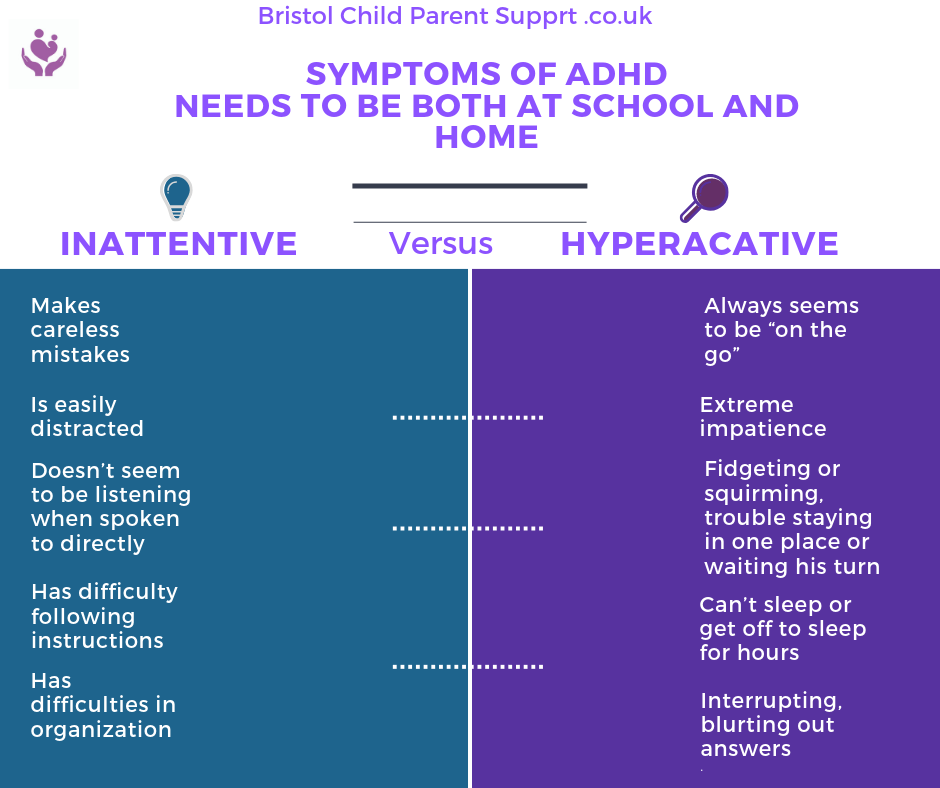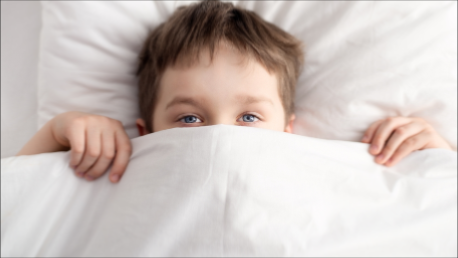Diagnosing ADHD can be a complex process. Unfortunately, many parents use online forms to diagnose their children. However, its common symptoms can be indicative of other disorders. Let’s examine normal development and other potential causes of attention difficulties.
What is ADHD?
ADHD includes three different kinds of behaviours:
Attention-deficit hyperactivity disorder (ADHD) is a behavioural disorder that often becomes obvious in early childhood (before 12). A specialist clinician usually diagnoses it, such as a Paediatrician, Psychiatrist, Specialist Nurse, etc.
What are the Symptoms of ADHD?
- Inattentive behaviours, in which a child has trouble paying attention
- Hyperactivity being on the go, restless and fidgety
- Impulsive behaviours, in which a child has too much energy and has difficulty controlling their impulses
According to the Royal College of Psychiatry:
ADHD can present different behaviours depending on age, setting (i.e., school, home, playground), and even motivation (e.g., when doing an activity or something a child likes).
Not all children have all the symptoms. Hence, some can have problems with poor attention, while others are mainly hyperactive.
Note: Girls are often undiagnosed!
They may be more likely to be incorrectly diagnosed with another mental health or neurodevelopmental condition.
Children with problems with attention can appear forgetful, distracted, not seem to listen and disorganised. As a result, your child takes ages to start something.
Children with hyperactivity seem restless, fidgety, and energised, ‘always on the go’. Therefore, they may seem loud and noisy with continuous chatter.
Children with symptoms of impulsivity do things without thinking. Consequently, they have difficulty waiting for their turn in games or a queue. You may notice that your child often interrupts you in conversation.
Why can some children with ADHD play video games for ages but not do their school work?

Experts say what’s disordered is the child’s ability to control and direct what he’s/she’s paying attention to.
Most children with ADHD can focus intensely on things that are exciting to them, like video games. Still, they can’t focus on things that aren’t immediately rewarding, like schoolwork, putting on their shoes, or going to bed.
Here is an excellent video from the National Centre of Mental Health to explain ADHD to children.
What’s typical development?
Many children, especially those under-five, have attention difficulties; this does not mean they have ADHD.
Are children not born with the capacity for self-control? Helping your child regulate is one of the essential tasks in parenting and within ourselves. Learning involves using the brain’s executive functions, mainly focusing, paying attention, engaging in a task, and using working memory.
Self-regulation is the ability to manage emotions and behaviour following the demands of the situation. We can also calm/self-sooth when upset and be flexible to a change in expectation or routine. It means your child can stay focused on their goal despite internal and external changes.
Often parents mistake difficulties in emotional regulation and deficits in executive functioning skills for ADHD.
You can find out more at my blog here Executive Functioning Skills versus Emotional Regulation.
Other Reasons For Attention Difficulties
To avoid misdiagnosing your child, you may want to consider other possibilities, such as:
Stress or Trauma?
Children can also suffer from inattention when trauma has impacted them. Children who’ve seen or been exposed to violence may have trouble paying attention, be anxious, and have a hypervigilant sense of insecurity. There is a possibility that this may lead to PTSD, whose symptoms are similar to ADHD.
Anxiety
A child who has trouble focusing at school may suffer from chronic worry. As a result, the anxiety makes it difficult for them to stay on task, and teachers often feel they are not paying attention. Many anxious children worry about speaking aloud in class or making a mistake, which may cause them to look distracted and not pay attention to avoid connecting with the teacher.
OCD
Older children often suffer from OCD. Consequently, obsessive thoughts and compulsions prevent them from paying attention and concentrating in class. Many teenagers go to great lengths to hide their symptoms.
Sleep Disorders
A psychiatrist named Vatsal Thakkar writes about the relationship between sleep disorders and attention deficit hyperactivity disorder in children and adults. It is a great article; you can read it here: diagnosing the Wrong Deficit.

It can also mimic ADHD symptoms if you do not sleep enough or have interrupted sleep. You may be hyperactive and unfocused, for example. If you think your teenager has ADHD, remember that the symptoms must be present throughout childhood, not just now. Because of work pressures and screens in their lives, and the effects of the pandemic combined with extensional anxiety for the future, many teenagers simply do not get enough sleep.
Learning Disorders
Children with undiagnosed dyslexia might fidget with frustration or feel ashamed that they can’t seem to do what other children can do. Children may have an undiagnosed sensory processing disorder or working memory and processing difficulties. If children don’t understand what’s happening around them, it’s hard for them to focus and join classwork. Often teachers think a child may have ADHD.
In Conclusion
Your child could struggle for many reasons. Any child deserves a complete and thorough assessment to receive the correct diagnosis and suitable treatment intervention.
Remember: parenting is hard work, and you deserve support. And when it all starts to feel impossible, ask for help. If you need help and support, contact me for a consultation or join my newsletter community. With gratitude Catherine
If you enjoyed this blog post and found it helpful or inspiring, please share it with your friends on social media by clicking on the icons on the side. Thank you for visiting my website!
Disclaimer
The content of my blog is provided for general information only. They are not intended to, and do not, amount to advice you should rely on. They are in no way an alternative to a specific direction.
Therefore, you must obtain the relevant professional or specialist advice before taking or refraining from any action based on the information in this blog.
If you have questions about any medical matter, consult your doctor or another professional healthcare provider immediately.



